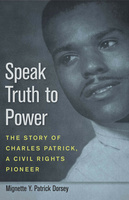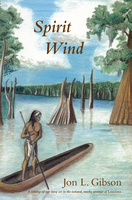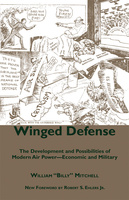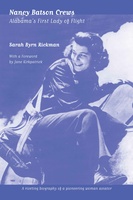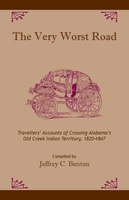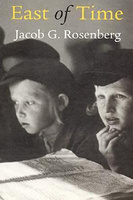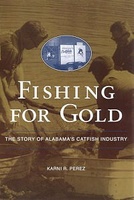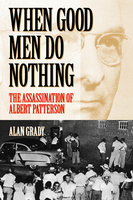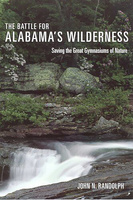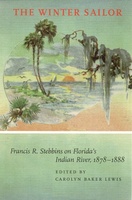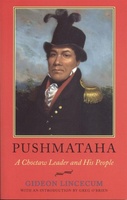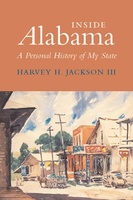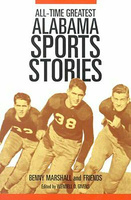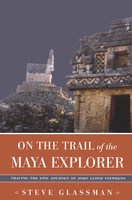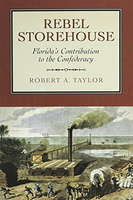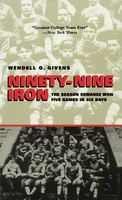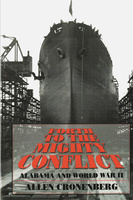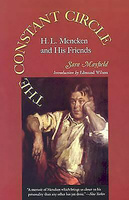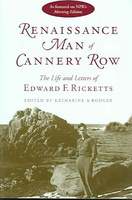Creekside
An Archaeological Novel
Creekside takes two partially interwoven story lines and linkes artifact and place, ancestors and descendants, the present and the past, and inspires the reader to explore the personal connections between them all in fresh and vital ways.
Speak Truth to Power
The Story of Charles Patrick, a Civil Rights Pioneer
Speak Truth to Power tells the story of Charles Patrick’s quest for justice in segregated Alabama on the eve of the Civil Rights movement and represents a telling instance of the growing determination of African Americans to be treated fairly, part of the broadening and deepening stream of resolve that led to the widespread activism of the Civil Rights movement.
Spirit Wind
A coming-of-age story set in the isolated, murky swamps of Louisiana.
Winged Defense
The Development and Possibilities of Modern Air Power--Economic and Military
This book is the basis for airpower doctrine in the US, and demonstrates how forward looking Gen Mitchell was even though the technology for conducting air operations was in its infancy when it was written. It is essential reading for anyone concerned with airpower history or aerospace doctrine.
Nancy Batson Crews
Alabama's First Lady of Flight
A riveting oral history/biography of a pioneering woman aviator.
The Very Worst Road
Travellers' Accounts of Crossing Alabama's Old Creek Indian Territory, 1820-1847
East of Time
The setting is Lodz, Poland, in the years between the author's childhood and early maturity, a period overtaken by the cataclysmic events of the 1930s and early 1940s. The narrative approach presents a powerful personal testament and reflects the determination of an entire community to remain human in the face of its greatest peril, even at the last frontier of life. East of Time received the 2006 New South Wales Premier's Award for the Best Book of Non-Fiction and was short-listed for the 2006 Australian Literary Society's Gold Medal and the South Australia Arts Festival Award for Innovation in Literature.
Hitler's Soldier in the U.S. Army
An Unlikely Memoir of World War II
Born into landed Prussian nobility, Werner H. Von Rosenstiel lived the largely predictable life of his class until two great changes intersected to forever alter his worldview: he attended college in Ohio for a year, and the Nazis came to power in Germany. Von Rosenstiel was drafted into the Wehrmacht, the German army, and had finished his legal education when tthe rising tide of Nazi madness and his affection for an American girl in Cincinnati brought him to resolve to leave Gernmany and return to the United States.
Fishing for Gold
The Story of Alabama's Catfish Industry
With a wonderful ear for dialogue and in flowing narrative style, Karni Perez weaves together oral histories collected from early hatchery owners, catfish farmers, processors, and researchers to recount the important contributions made by Alabamians to the channel catfish industry.
To the Far Side of Hell
The Battle for Peleliu, 1944
To the Far Side of Hell is the story of the World War II battle for the Pacific island of Peleliu in the autumn of 1944.
Old Mobile Archaeology
Archaeological excavations since 1989 have uncovered exciting evidence of the original townsite of Mobile, first capital of the Louisiana colony, and remnants of the colony's port on Dauphin Island.
When Good Men Do Nothing
The Assassination Of Albert Patterson
A provocative telling of "The Phenix City Story."
Let Us Now Praise Famous Women
A Memoir
An affectionate, humorous account of small town Alabama during the civil rights era.
The Battle for Alabama's Wilderness
Saving the Great Gymnasiums of Nature
Traces the development of Alabama's environmental movement from its beginnings with the establishment of The Alabama Conservancy in the late 1960s and early '70s to the preservation efforts of present-day activist groups
The Winter Sailor
Francis R. Stebbins on Florida's Indian River, 1878-1888
A unique guide to Florida's frontier history along Indian River.
Grass Widow
Making My Way in Depression Alabama
Viola Goode Liddell’s short memoir tells the story of her return to Alabama in search of a husband and a new life. Thirty years old and recently divorced, Liddell comes back to her home state—with her young son—determined to survive, during the depths of the Depression. Liddell narrates the obstacles she faces as a single mother in the 1930s Deep South with self-deprecating humor and a confessional tone that reveal both her intelligence and her unapologetic ambitions.
Pushmataha
A Choctaw Leader and His People
Inside Alabama
A Personal History of My State
An affectionate, irreverent, candid look at the "Heart of Dixie"
All-Time Greatest Alabama Sports Stories
On the Trail of the Maya Explorer
Tracing the Epic Journey of John Lloyd Stephens
Steve Glassman retraces John Lloyd Stephens' 1839 route, visiting the same archaeological sites, towns, markets, and churches and meeting along the way the descendants of those people Stephens described, from mestizo en route to the cornfields to town elders welcoming the Norte Americanos. Glassman's work interlaces discussion of the history, natural environment, and architecture of the region with descriptions of the people who live and work there. Glassman compares his 20th-century experience with Stephens's 19th-century exploration, gazing in awe at the same monumental pyramids, eating similar foods, and avoiding the political clashes that disrupt the governments and economies of the area.
Rebel Storehouse
Florida's Contribution to the Confederacy
Brings to light an overlooked aspect of Florida’s importance to the Confederacy
Ninety-Nine Iron
The Season Sewanee Won Five Games in Six Days
Forth to the Mighty Conflict
Alabama and World War II
Details conditions in Alabama and the role of its citizens in a time of military crisis unknown since the Civil War
The Constant Circle
H. L. Mencken and His Friends
A warm and intimate account of a complex, contradictory man seen through the eyes of a long-standing friend and confidante.
Renaissance Man of Cannery Row
The Life and Letters of Edward F. Ricketts
Marine biologist Edward F. Ricketts is perhaps best known as the inspiration for John Steinbeck's most empathic literary characters Doc in Cannery Row, Slim in Of Mice and Men, Jim Casy in The Grapes of Wrath, and Lee in East of Eden. The correspondence of this accomplished scientist, writer, and philosopher reveals the influential exchange of ideas he shared with such prominent thinkers and artists as Henry Miller, Joseph Campbell, Ellwood Graham, and James Fitzgerald, in addition to Steinbeck, all of whom were drawn to Ricketts's Monterey Bay laboratory, a haven of intellectual discourse and Bohemian culture in the 1930s and 1940s. The 125 previously unpublished letters of this collection, housed at the Stanford University Library, document the broad range of Ricketts's interests and accomplishments during the last 12 and most productive years of his life.


